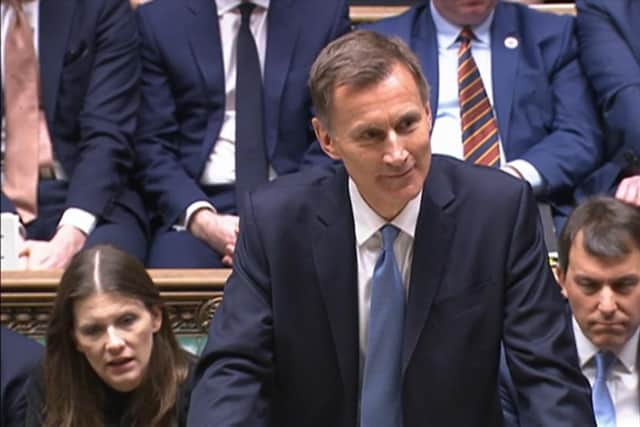Budget 2023: What is in the Budget announced by Chancellor Jeremy Hunt? What does it mean for Scottish households?
For a start, we’ll avoid a recession, which means greater job security, particularly for the self-employed and business owners.
Inflation is also expected to fall to 2.9 per cent by the end of this year, down from 10.7 per cent. However, this still means the money in your pocket will be worth around 3 per cent less, and unless you’ve had a pay rise of 3 per cent or above this year, you’ve had a pay cut in terms of spending power.
Advertisement
Hide AdAdvertisement
Hide AdThat said, inflation was around 10 per cent over Christmas, so while your annual salary may be worth less, it will be worth more than if inflation was expected to still be hovering around the double-digit mark towards the end of the year.


In short, we haven’t seen the back of high bills and stretched household budgets. The worldwide cost-of-living crisis has been caused by disruption to global supply chains, which in turn has been caused by both the Covid pandemic and Russia’s invasion of Ukraine. The actions of domestic governments are therefore unlikely to resolve these problems.
Governments can, however, alleviate the financial pain of the cost-of-living crisis. So what is in store for Scottish households?
Energy bills - prices set to rise in April, but less than previously thought
The UK Government has announced the Energy Price Guarantee is set to remain at the same level for another three months. Over the winter, the Government has been limiting average household bills to £2,500 a year, plus a £400 winter discount.


Typical household energy bills had been due to rise to £3,000 a year from April, but instead the cap will be kept at £2,500 until the end of June.
The additional £400 winter discount, which households have been receiving since October, will still come to an end in April, meaning household energy bills will still likely rise.
The SNP’s Westminster leader Stephen Flynn touched on a similar point just before the Budget was announced in the Commons, telling Prime Minister Rishi Sunak energy bills haven't been frozen at £2,500, and the average bill in Scotland is more like £3,000.
The UK Government has also announced an end to the premium paid by those on pre-payment meters. Four million prepayment meter customers will no longer pay more per unit of gas and electricity than those who pay via direct debit, which has historically been the case due to the higher fixed costs involved. However, the cost of this change might be shared across everyone’s bills.
Jobs - it’s still a sellers market
Advertisement
Hide AdAdvertisement
Hide AdThere are still 1.1 million job vacancies in the UK following ‘the great resignation’. Theoretically, job seekers can afford to be picky and demand better pay and conditions for their services as employers struggle to fill roles, particularly in low-paid, challenging roles such as social care. Now might be the time to ask your boss for an inflation-busting pay increase.
While that number has been coming down, there are still 328,000 more vacancies than before the Covid pandemic. As per the Autumn Budget, minimum wage for people aged over 23 is still set to increase from £9.50 to £10.42 an hour from next month.
Childcare - money coming down the line
The childcare announcements won’t affect Scottish parents, as education is devolved. However, there will be Barnett Formula consequentials, meaning whoever succeeds in the race to become the next first minister will have more money to support childcare in Scotland. One of the leadership contenders, Humza Yousaf, has pledged children aged one and two years old would be covered by more free childcare if he succeeds Nicola Sturgeon. He has committed to using his first Budget to expand free provision, with a goal of offering 22 hours a week throughout the year.
Fuel - frozen
Fuel duty will be frozen and a 5p reduction will be maintained for a further year. The Government says this will save the average motorists £100 a year.
Alcohol - only draught frozen
The obligatory announcement on alcohol will see the tax on a pint frozen. From August, the duty on draught products in pubs will be up to 11p lower than the duty in supermarkets – "a differential we will maintain as part of a new Brexit pubs guarantee", according to Mr Hunt.
However, drinkers will see tax on other alcohol products soar by 10.1 per cent in August in line with inflation after being frozen during the peak of the cost-of-living crisis.
Tax - rising for large businesses
Corporation tax for businesses, which is reserved to Westminster, is to increase from 19 per cent to 25 per cent, as previously announced, meaning businesses which make a profit of more than £250,000 will pay 25 per cent tax on their profits from April.
For smaller business owners, Mr Hunt is introducing "full expensing", which the Chancellor says will mean that every single pound a company invests in IT equipment, plant or machinery can be deducted in full and immediately from taxable profits.
Advertisement
Hide AdAdvertisement
Hide AdSmall or medium-sized businesses will be able to claim a credit worth £27 for every £100 they spend if they spend 40 per cent or more of their total expenditure on Research and Development,
Pensions – lifetime limit is scrapped
Mr Hunt has announced the lifetime allowance limit on tax-free pension contributions, previously set at £1.07 million, is being abolished. The pensions annual tax-free allowance is being raised by 50 per cent from £40,000 to £60,000.
Local schemes – government grants
It is good news if you live in Edinburgh or Elgin, as Mr Hunt announced funding for the Edinburgh festivals and a bridge in Moray.
On top of the additional £320 million funding in Barnett consequentials for the Scottish Government, the Chancellor announced up to £8.6m of targeted funding for the Edinburgh Festivals – first revealed exclusively in The Scotsman – and £1.5m to repair Cloddach Bridge, just to the south of Elgin in the Moray Council area.
Comments
Want to join the conversation? Please or to comment on this article.